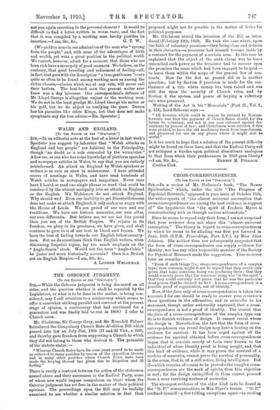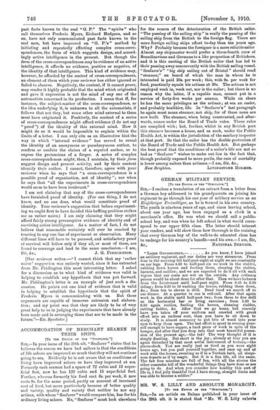CROSS-CORRESPONDENCES.
[TO THE EDITOR OF THE "SPECTATOR:1
SIR,—In a review of Mr. Podmore's book, "The Newer Spiritualism," which, under the title "The Progress of
Psychical Research," appeared in your issue of October 15th, the writer speaks of "the almost universal assumption that cross-correspondences are among the best evidence in support of" the hypothesis that "the spirit of Frederic Myers is communicating with us through various automatists."
Since he seems to regard only their form, I am not surprised that your reviewer does not share this "almost universal assumption." The theory in regard to cross-correspondences to which he seems to be alluding was first put forward in
June, 1908 (S.P.R. Proceedings, Part LV.), by Miss Alice Johnson. She neither then nor subsequently suggested that
the form of cross-correspondences can supply evidence for identity; nor has any other responsible member of the Society for Psychical Research made the suggestion. Your reviewer later on remarks :—
"Even if such things [i.e., cross-correspondences of a complex type] were common, might it not be argued that they would only prove that some conscious being was producing them ; that they would scarcely prove that the conscious being was 'in the spirit' ; that they would certainly not prove that he was the particular dead person that he claimed to be ? A cross-correspondence is a possible proof of organisation, not of identity."
Now, if the forns only of cross-correspondences is taken into account, I for one should be ready to answer your reviewer's three questions in the affirmative, and to subscribe to his statement, though rather awkwardly expressed, that a cross- correspondence is not a proof of identity. The utmost that the form of a cross-correspondence of the complex type can do is to furnish evidence of design. It cannot reveal whose the design is. Nevertheless, the fact that the form of cross- correspondences can reveal design may have a bearing on the evidence for survival. It has been urged against all the evidence for survival obtained before cross-correspondences began that it consists merely of facts once known to the individual of whose identity proof is being sought, and that this kind of evidence, while it may prove the survival of a nucleus of memories, cannot prove the survival of personality, in the sense, that is, of a still active, living intelligence. But
if—which remains of course to be proved—the complex cross- correspondences are the work of spirits, then this objection is met ; for the design exemplified in them cannot proceed from a mere surviving nucleus of memories.
The strongest evidence of the older kind islo be found in the "(1. P." communications in Mrs. Piper's trance. "G. P." confined himself—a few trifling exceptions apart—to reciting
past facts known to the real "G. P." The " spirits " who call themselves Frederic Myers, Richard Hodgson, and so on, have not only communicated past facts known to the real men, but have improved on " G. P.'s" method by initiating and repeatedly effecting complex cross-corre- spondences, the form of which suggests design, and accord- ingly active intelligence in the present. But though the form of the cross-correspondences may be evidence of an active intelligence, it affords no evidence, positive or negative, of the identity of that intelligence. This kind of evidence may, however, be afforded by the content of cross-correspondences, an element of them which your reviewer has either ignored or failed to observe. Negatively, the content, if it cannot prove, may render it highly probable that the mind which originated and gave it expression is not the mind of any one of the automatists concerned in its production. I mean that if, for instance, the subject-matter of the cross-correspondence, or the idea underlying it, is unknown to all the antomatists, it follows that not they, but some other mind external to them must have originated it. Positively, the content of a series of cross-correspondences might afford evidence (I do not say " proof ") of the identity of this external mind. How it might do so it would be impossible to explain within the limits of a letter. I can only cite as an illustrative hint the way in which "internal evidence" has served to reveal the identity of an anonymous or pseudonymous author, to confirm or confute the claims of a reputed author, or to expose the pretensions of a forger. A series of complex cross-correspondences might, then, I maintain, by their form suggest design and present activity, and by their content identify their author. I cannot, therefore, agree with your reviewer when he says that "a cross-correspondence is a possible proof of organisation, not of identity "; nor when he says that "all the experiments in cross-correspondence would seem to have been irrelevant."
I am not claiming that any of the cross-correspondences have furnished proof of identity. (For one thing, I do not know, and no one does, what would constitute proof of identity. Your reviewer's suggestion that before experiment- ing we ought first to have decided this baffling problem strikes me as rather naive.) I am only claiming that they might afford fairly strong presumptive evidence of identity and of surviving active intelligence. As a matter of fact, I do not believe that reasonable certainty will ever be reached by trusting to any one line of experiment or observation. Many different lines will have to be pursued, and satisfactory proof of survival will follow only if they all, or most of them, are found to converge and lead to the same conclusion.—I am,
[Our reviewer writes i—" I cannot think that my 'rather naïve' suggestion was entirely wasted, since it has extracted from Mr. Piddington this most interesting letter. I asked for a discussion as to what kind of evidence was valid in helping to establish any hypothesis that was put forward. Mr. Piddington's letter is an example of just such a dis- cussion. He points out one kind of evidence that is valid in helping to establish the hypothesis that the spirit of Frederic Myers is communicating with us. But these arguments are capable of immense extension and elabora- tion; and my point was that they are likely to be of very great help to us in judging the experiments that have already been made and in arranging those that are to be made in the future."—ED. Spectator.]



































































 Previous page
Previous page